Final Essay: Review of Burke's Mediterranean History Article
VerifiedAdded on 2022/08/29
|5
|929
|14
Essay
AI Summary
This essay provides a critical review of Edmund Burke III's article, "Toward a Comparative History of the Modern Mediterranean, 1750–1919." The essay examines the author's central argument, which explores the Mediterranean's historical experience, its shift towards semi-peripherality in a globalized, capitalistic world, and the influence of cultural factors on its modernization. The review analyzes Burke's methodology, including his use of sources, and evaluates his thesis. The essay discusses migration's impact, cultural shifts, and the rise and fall of empires in the Mediterranean. It emphasizes the importance of understanding the region's history within a global context, while also addressing the challenges of colonialism and the influence of Islam. The essay concludes by assessing the overall value and contribution of Burke's work to the field of Mediterranean history.
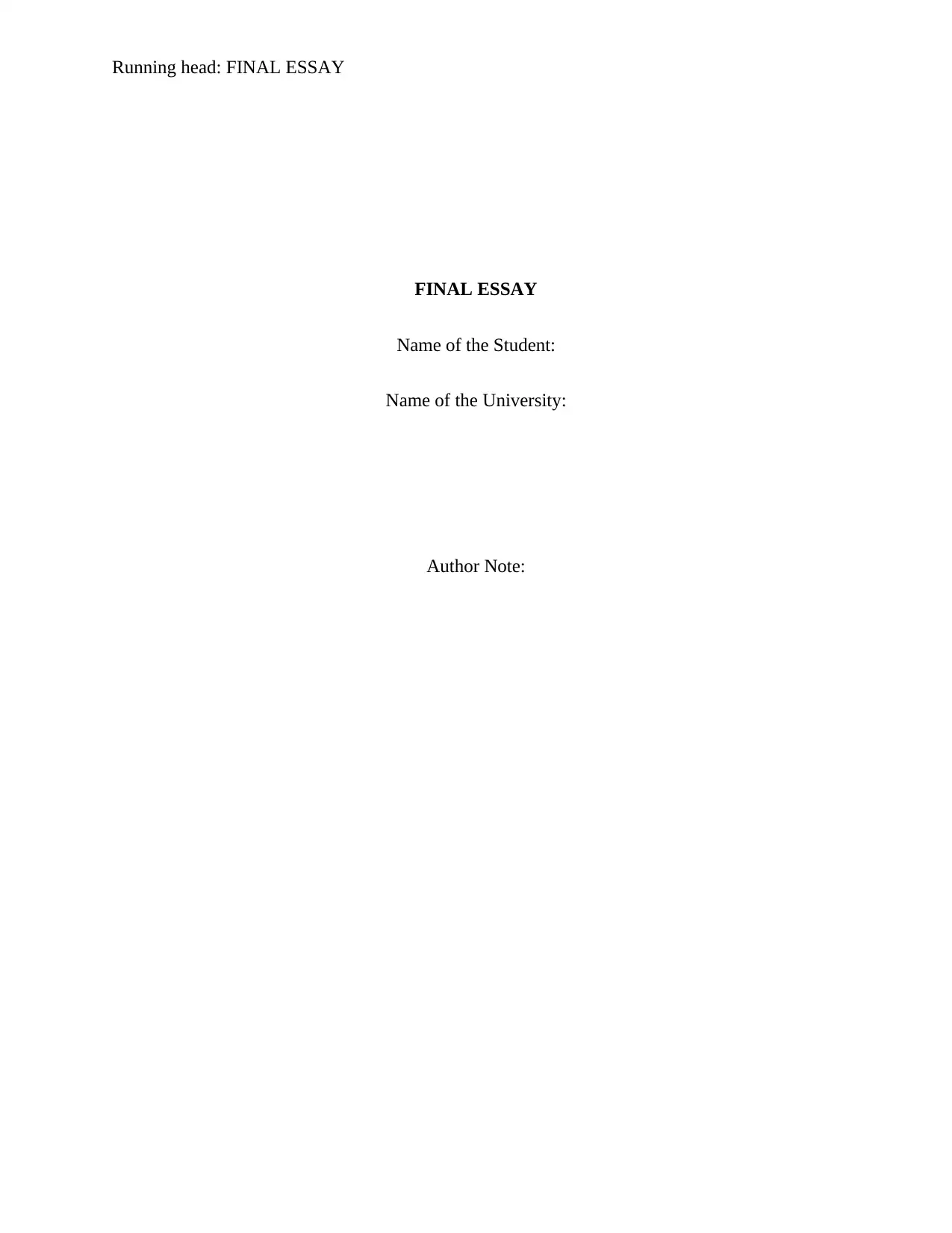
Running head: FINAL ESSAY
FINAL ESSAY
Name of the Student:
Name of the University:
Author Note:
FINAL ESSAY
Name of the Student:
Name of the University:
Author Note:
Paraphrase This Document
Need a fresh take? Get an instant paraphrase of this document with our AI Paraphraser
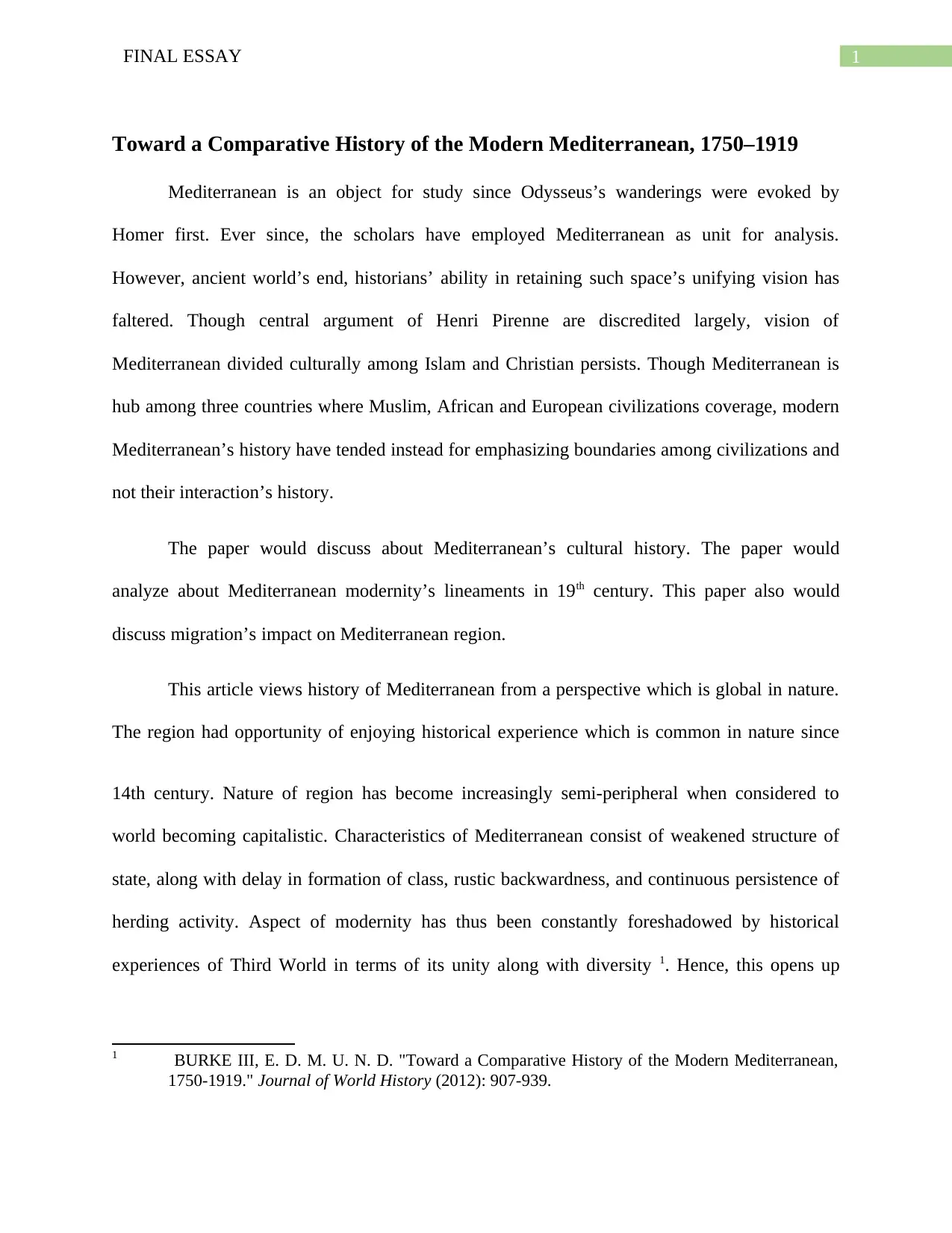
1FINAL ESSAY
Toward a Comparative History of the Modern Mediterranean, 1750–1919
Mediterranean is an object for study since Odysseus’s wanderings were evoked by
Homer first. Ever since, the scholars have employed Mediterranean as unit for analysis.
However, ancient world’s end, historians’ ability in retaining such space’s unifying vision has
faltered. Though central argument of Henri Pirenne are discredited largely, vision of
Mediterranean divided culturally among Islam and Christian persists. Though Mediterranean is
hub among three countries where Muslim, African and European civilizations coverage, modern
Mediterranean’s history have tended instead for emphasizing boundaries among civilizations and
not their interaction’s history.
The paper would discuss about Mediterranean’s cultural history. The paper would
analyze about Mediterranean modernity’s lineaments in 19th century. This paper also would
discuss migration’s impact on Mediterranean region.
This article views history of Mediterranean from a perspective which is global in nature.
The region had opportunity of enjoying historical experience which is common in nature since
14th century. Nature of region has become increasingly semi-peripheral when considered to
world becoming capitalistic. Characteristics of Mediterranean consist of weakened structure of
state, along with delay in formation of class, rustic backwardness, and continuous persistence of
herding activity. Aspect of modernity has thus been constantly foreshadowed by historical
experiences of Third World in terms of its unity along with diversity 1. Hence, this opens up
1 BURKE III, E. D. M. U. N. D. "Toward a Comparative History of the Modern Mediterranean,
1750-1919." Journal of World History (2012): 907-939.
Toward a Comparative History of the Modern Mediterranean, 1750–1919
Mediterranean is an object for study since Odysseus’s wanderings were evoked by
Homer first. Ever since, the scholars have employed Mediterranean as unit for analysis.
However, ancient world’s end, historians’ ability in retaining such space’s unifying vision has
faltered. Though central argument of Henri Pirenne are discredited largely, vision of
Mediterranean divided culturally among Islam and Christian persists. Though Mediterranean is
hub among three countries where Muslim, African and European civilizations coverage, modern
Mediterranean’s history have tended instead for emphasizing boundaries among civilizations and
not their interaction’s history.
The paper would discuss about Mediterranean’s cultural history. The paper would
analyze about Mediterranean modernity’s lineaments in 19th century. This paper also would
discuss migration’s impact on Mediterranean region.
This article views history of Mediterranean from a perspective which is global in nature.
The region had opportunity of enjoying historical experience which is common in nature since
14th century. Nature of region has become increasingly semi-peripheral when considered to
world becoming capitalistic. Characteristics of Mediterranean consist of weakened structure of
state, along with delay in formation of class, rustic backwardness, and continuous persistence of
herding activity. Aspect of modernity has thus been constantly foreshadowed by historical
experiences of Third World in terms of its unity along with diversity 1. Hence, this opens up
1 BURKE III, E. D. M. U. N. D. "Toward a Comparative History of the Modern Mediterranean,
1750-1919." Journal of World History (2012): 907-939.
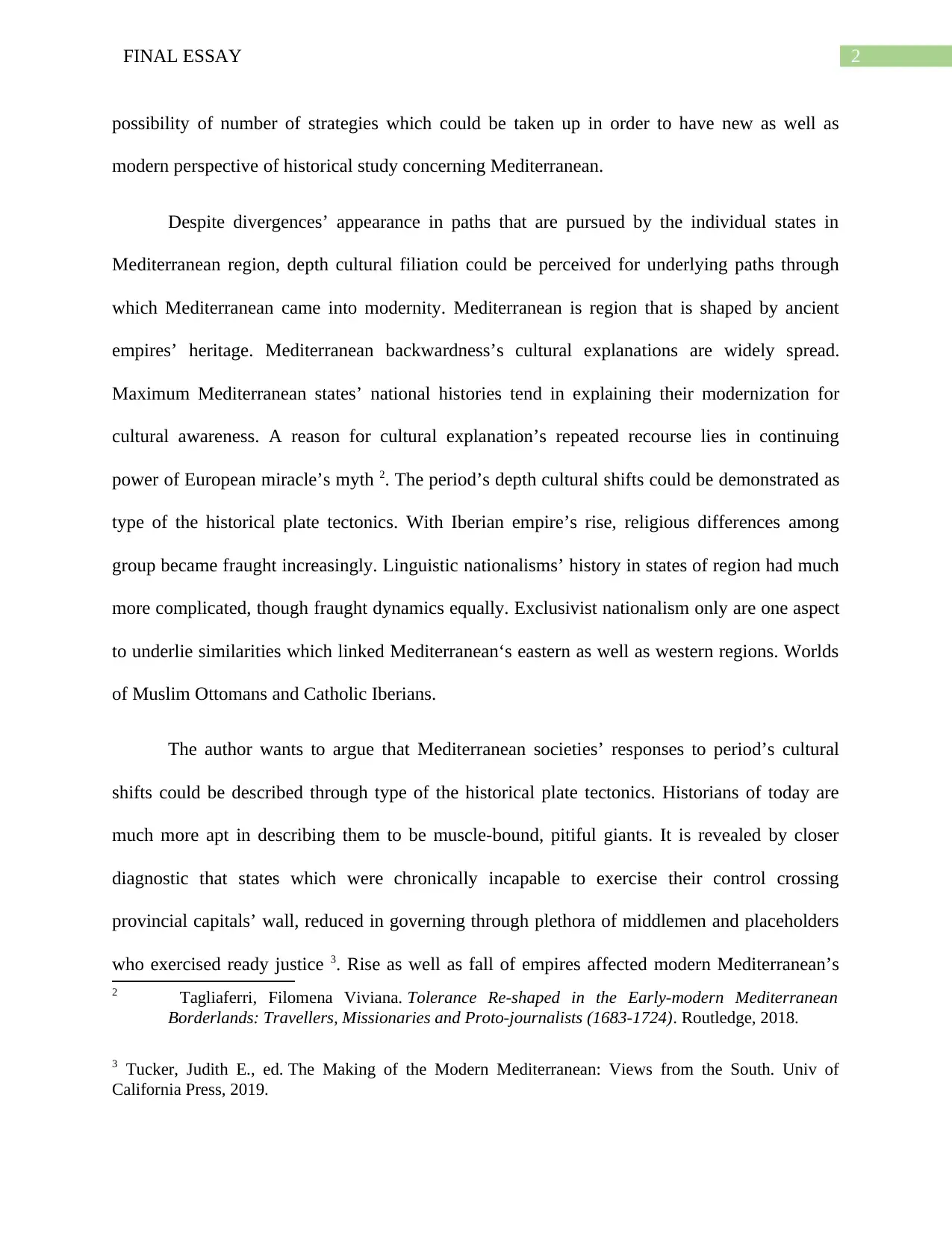
2FINAL ESSAY
possibility of number of strategies which could be taken up in order to have new as well as
modern perspective of historical study concerning Mediterranean.
Despite divergences’ appearance in paths that are pursued by the individual states in
Mediterranean region, depth cultural filiation could be perceived for underlying paths through
which Mediterranean came into modernity. Mediterranean is region that is shaped by ancient
empires’ heritage. Mediterranean backwardness’s cultural explanations are widely spread.
Maximum Mediterranean states’ national histories tend in explaining their modernization for
cultural awareness. A reason for cultural explanation’s repeated recourse lies in continuing
power of European miracle’s myth 2. The period’s depth cultural shifts could be demonstrated as
type of the historical plate tectonics. With Iberian empire’s rise, religious differences among
group became fraught increasingly. Linguistic nationalisms’ history in states of region had much
more complicated, though fraught dynamics equally. Exclusivist nationalism only are one aspect
to underlie similarities which linked Mediterranean‘s eastern as well as western regions. Worlds
of Muslim Ottomans and Catholic Iberians.
The author wants to argue that Mediterranean societies’ responses to period’s cultural
shifts could be described through type of the historical plate tectonics. Historians of today are
much more apt in describing them to be muscle-bound, pitiful giants. It is revealed by closer
diagnostic that states which were chronically incapable to exercise their control crossing
provincial capitals’ wall, reduced in governing through plethora of middlemen and placeholders
who exercised ready justice 3. Rise as well as fall of empires affected modern Mediterranean’s
2 Tagliaferri, Filomena Viviana. Tolerance Re-shaped in the Early-modern Mediterranean
Borderlands: Travellers, Missionaries and Proto-journalists (1683-1724). Routledge, 2018.
3 Tucker, Judith E., ed. The Making of the Modern Mediterranean: Views from the South. Univ of
California Press, 2019.
possibility of number of strategies which could be taken up in order to have new as well as
modern perspective of historical study concerning Mediterranean.
Despite divergences’ appearance in paths that are pursued by the individual states in
Mediterranean region, depth cultural filiation could be perceived for underlying paths through
which Mediterranean came into modernity. Mediterranean is region that is shaped by ancient
empires’ heritage. Mediterranean backwardness’s cultural explanations are widely spread.
Maximum Mediterranean states’ national histories tend in explaining their modernization for
cultural awareness. A reason for cultural explanation’s repeated recourse lies in continuing
power of European miracle’s myth 2. The period’s depth cultural shifts could be demonstrated as
type of the historical plate tectonics. With Iberian empire’s rise, religious differences among
group became fraught increasingly. Linguistic nationalisms’ history in states of region had much
more complicated, though fraught dynamics equally. Exclusivist nationalism only are one aspect
to underlie similarities which linked Mediterranean‘s eastern as well as western regions. Worlds
of Muslim Ottomans and Catholic Iberians.
The author wants to argue that Mediterranean societies’ responses to period’s cultural
shifts could be described through type of the historical plate tectonics. Historians of today are
much more apt in describing them to be muscle-bound, pitiful giants. It is revealed by closer
diagnostic that states which were chronically incapable to exercise their control crossing
provincial capitals’ wall, reduced in governing through plethora of middlemen and placeholders
who exercised ready justice 3. Rise as well as fall of empires affected modern Mediterranean’s
2 Tagliaferri, Filomena Viviana. Tolerance Re-shaped in the Early-modern Mediterranean
Borderlands: Travellers, Missionaries and Proto-journalists (1683-1724). Routledge, 2018.
3 Tucker, Judith E., ed. The Making of the Modern Mediterranean: Views from the South. Univ of
California Press, 2019.
⊘ This is a preview!⊘
Do you want full access?
Subscribe today to unlock all pages.

Trusted by 1+ million students worldwide
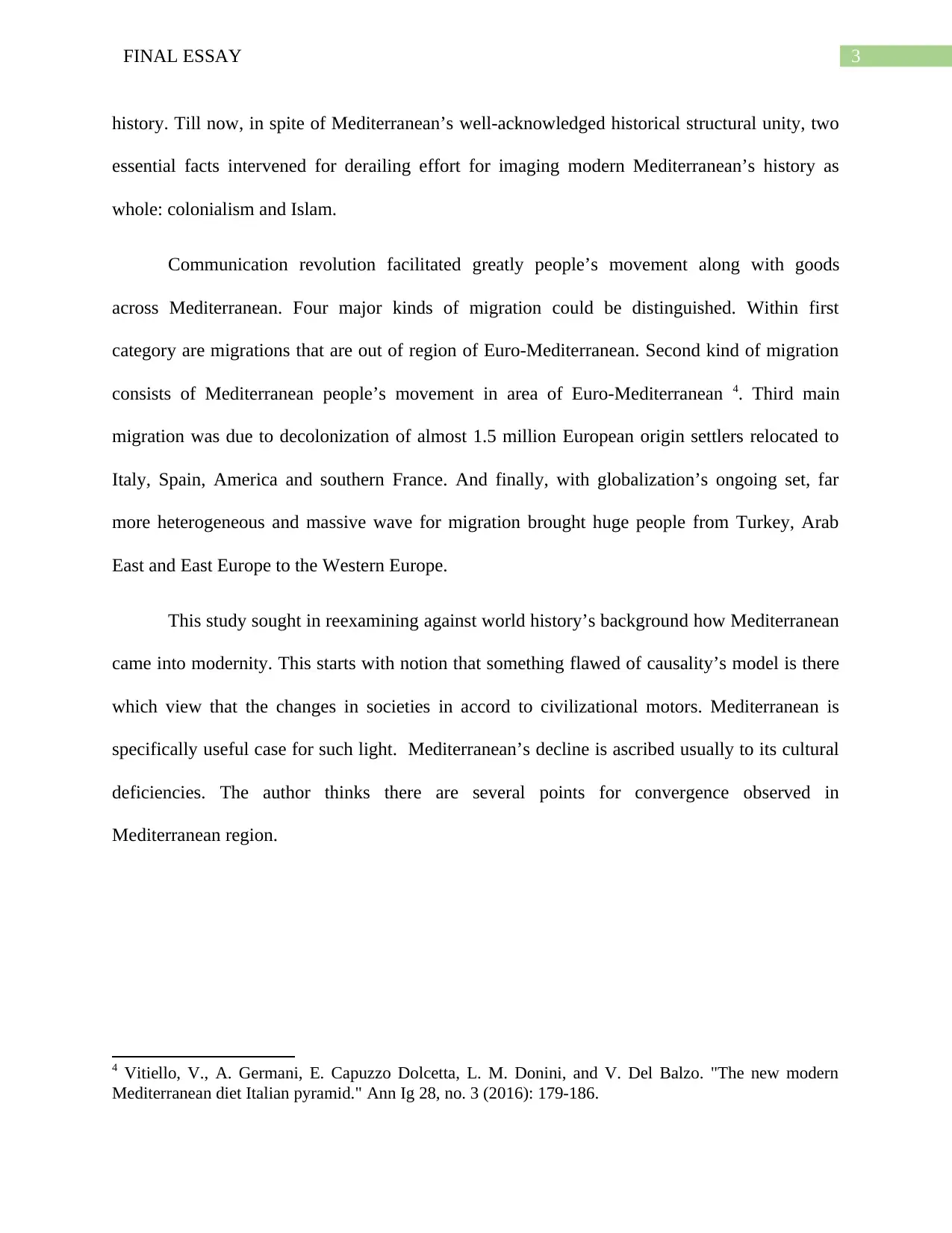
3FINAL ESSAY
history. Till now, in spite of Mediterranean’s well-acknowledged historical structural unity, two
essential facts intervened for derailing effort for imaging modern Mediterranean’s history as
whole: colonialism and Islam.
Communication revolution facilitated greatly people’s movement along with goods
across Mediterranean. Four major kinds of migration could be distinguished. Within first
category are migrations that are out of region of Euro-Mediterranean. Second kind of migration
consists of Mediterranean people’s movement in area of Euro-Mediterranean 4. Third main
migration was due to decolonization of almost 1.5 million European origin settlers relocated to
Italy, Spain, America and southern France. And finally, with globalization’s ongoing set, far
more heterogeneous and massive wave for migration brought huge people from Turkey, Arab
East and East Europe to the Western Europe.
This study sought in reexamining against world history’s background how Mediterranean
came into modernity. This starts with notion that something flawed of causality’s model is there
which view that the changes in societies in accord to civilizational motors. Mediterranean is
specifically useful case for such light. Mediterranean’s decline is ascribed usually to its cultural
deficiencies. The author thinks there are several points for convergence observed in
Mediterranean region.
4 Vitiello, V., A. Germani, E. Capuzzo Dolcetta, L. M. Donini, and V. Del Balzo. "The new modern
Mediterranean diet Italian pyramid." Ann Ig 28, no. 3 (2016): 179-186.
history. Till now, in spite of Mediterranean’s well-acknowledged historical structural unity, two
essential facts intervened for derailing effort for imaging modern Mediterranean’s history as
whole: colonialism and Islam.
Communication revolution facilitated greatly people’s movement along with goods
across Mediterranean. Four major kinds of migration could be distinguished. Within first
category are migrations that are out of region of Euro-Mediterranean. Second kind of migration
consists of Mediterranean people’s movement in area of Euro-Mediterranean 4. Third main
migration was due to decolonization of almost 1.5 million European origin settlers relocated to
Italy, Spain, America and southern France. And finally, with globalization’s ongoing set, far
more heterogeneous and massive wave for migration brought huge people from Turkey, Arab
East and East Europe to the Western Europe.
This study sought in reexamining against world history’s background how Mediterranean
came into modernity. This starts with notion that something flawed of causality’s model is there
which view that the changes in societies in accord to civilizational motors. Mediterranean is
specifically useful case for such light. Mediterranean’s decline is ascribed usually to its cultural
deficiencies. The author thinks there are several points for convergence observed in
Mediterranean region.
4 Vitiello, V., A. Germani, E. Capuzzo Dolcetta, L. M. Donini, and V. Del Balzo. "The new modern
Mediterranean diet Italian pyramid." Ann Ig 28, no. 3 (2016): 179-186.
Paraphrase This Document
Need a fresh take? Get an instant paraphrase of this document with our AI Paraphraser
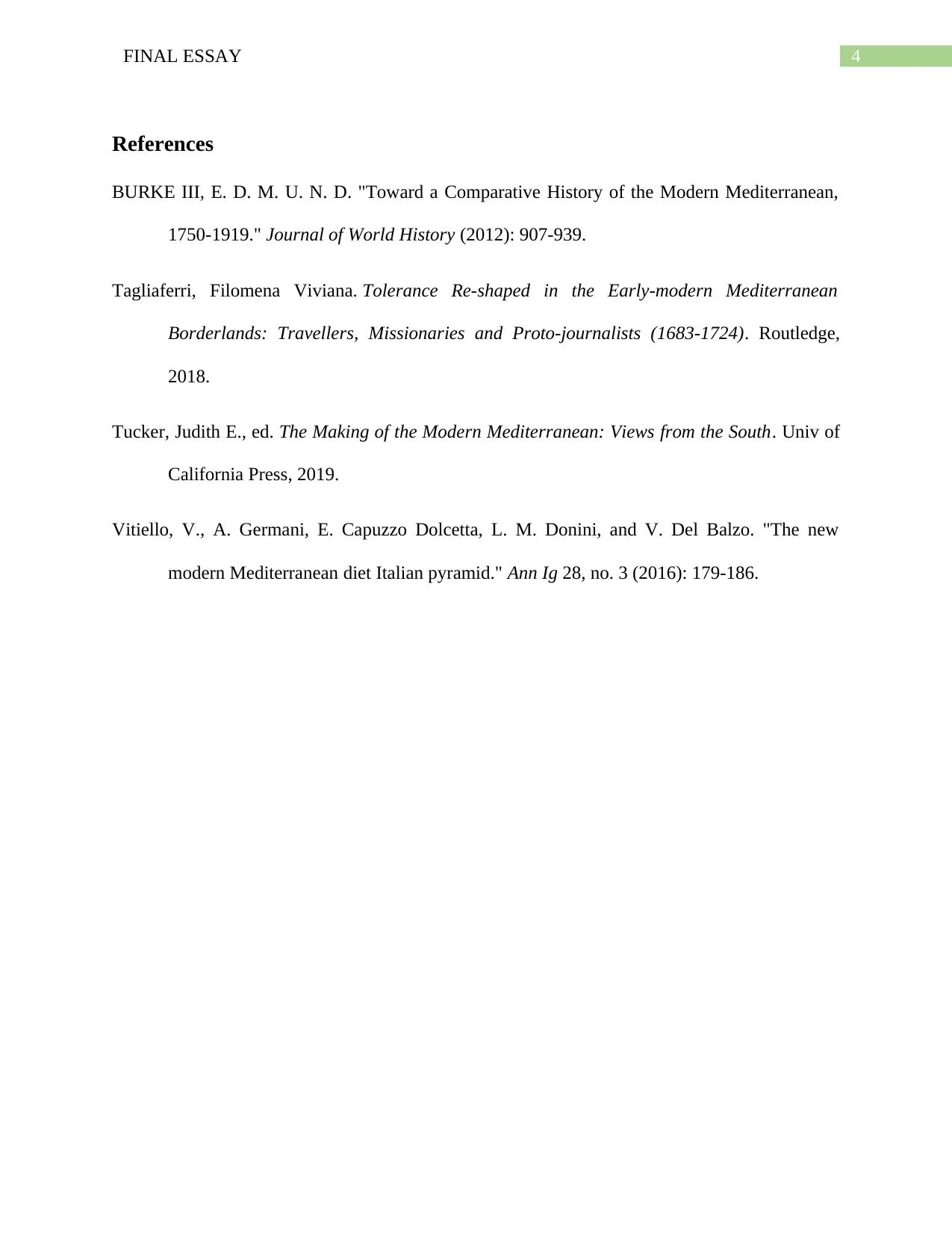
4FINAL ESSAY
References
BURKE III, E. D. M. U. N. D. "Toward a Comparative History of the Modern Mediterranean,
1750-1919." Journal of World History (2012): 907-939.
Tagliaferri, Filomena Viviana. Tolerance Re-shaped in the Early-modern Mediterranean
Borderlands: Travellers, Missionaries and Proto-journalists (1683-1724). Routledge,
2018.
Tucker, Judith E., ed. The Making of the Modern Mediterranean: Views from the South. Univ of
California Press, 2019.
Vitiello, V., A. Germani, E. Capuzzo Dolcetta, L. M. Donini, and V. Del Balzo. "The new
modern Mediterranean diet Italian pyramid." Ann Ig 28, no. 3 (2016): 179-186.
References
BURKE III, E. D. M. U. N. D. "Toward a Comparative History of the Modern Mediterranean,
1750-1919." Journal of World History (2012): 907-939.
Tagliaferri, Filomena Viviana. Tolerance Re-shaped in the Early-modern Mediterranean
Borderlands: Travellers, Missionaries and Proto-journalists (1683-1724). Routledge,
2018.
Tucker, Judith E., ed. The Making of the Modern Mediterranean: Views from the South. Univ of
California Press, 2019.
Vitiello, V., A. Germani, E. Capuzzo Dolcetta, L. M. Donini, and V. Del Balzo. "The new
modern Mediterranean diet Italian pyramid." Ann Ig 28, no. 3 (2016): 179-186.
1 out of 5
Your All-in-One AI-Powered Toolkit for Academic Success.
+13062052269
info@desklib.com
Available 24*7 on WhatsApp / Email
![[object Object]](/_next/static/media/star-bottom.7253800d.svg)
Unlock your academic potential
Copyright © 2020–2026 A2Z Services. All Rights Reserved. Developed and managed by ZUCOL.